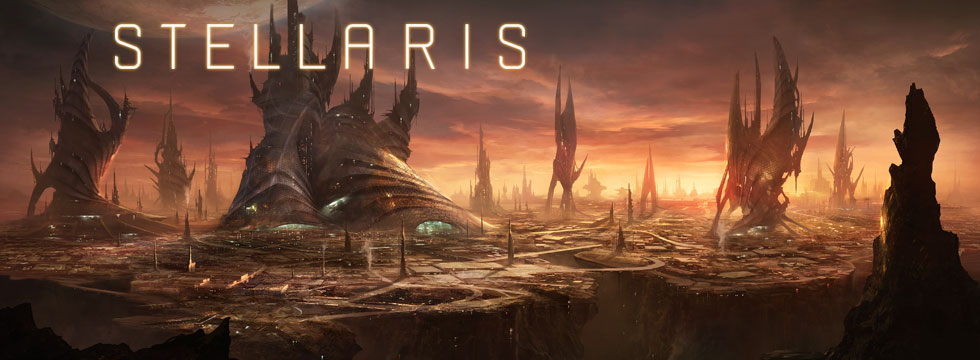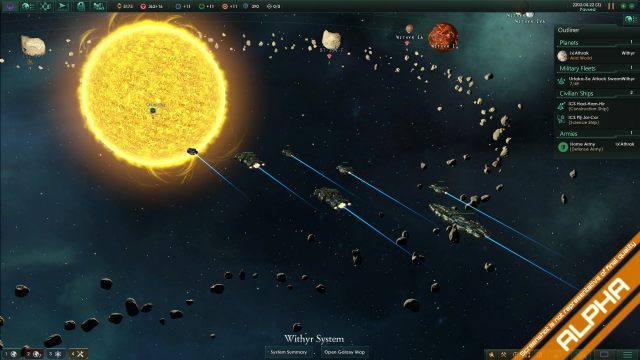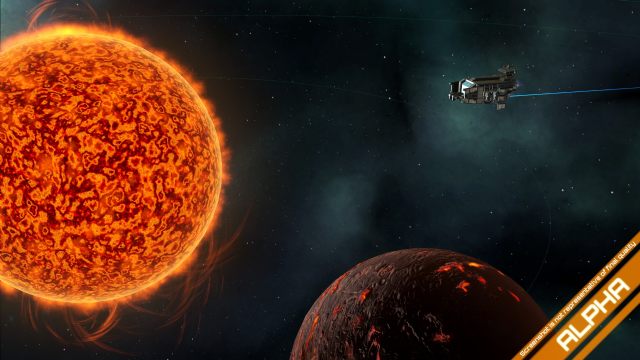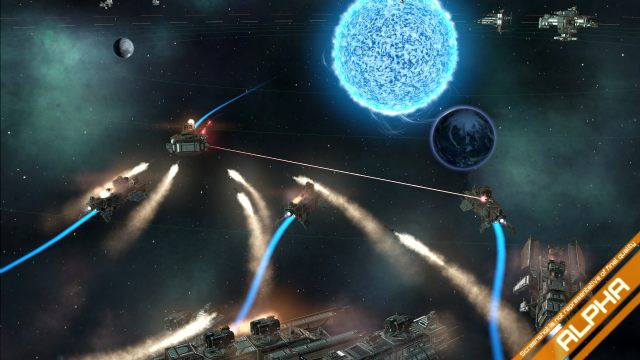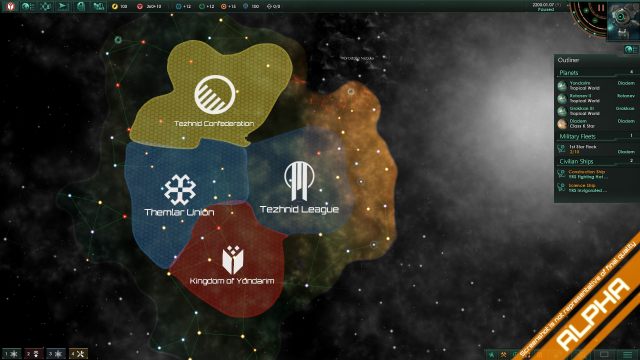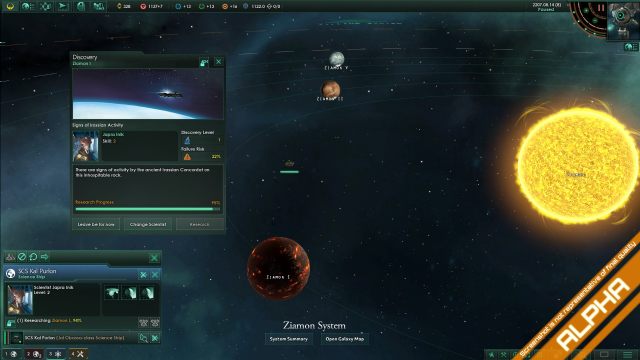First Look at Stellaris: Masters from Paradox Head to Space
Stellaris is one of the nicest surprises we got at this year’s gamescom. Paradox Interactive is making a game in a science-fiction setting for the first time, but they do it brilliantly – Stellaris is a complex strategy that will blow you away.
Read the review Stellaris Review – Paradox conquers outer space
This text was based on the PC version.
The development division of Paradox Interactive has reached the point when they could make historic RTS games on a sewing machine with their eyes closed while handcuffed to a bathroom radiator; and even then it would be a better game than what most of their competition can manage. Nevertheless, Stellaris seems like a jump off the deep end of the pool even for them. The Swedes are completely new to the Sci-Fi setting while their newest project has all the marks of a typical 4X (eXplore, eXpand, eXploit, and eXterminate) game. After the gamescom presentation, however, it’s hard to avoid the impression that breaking the pattern may have been a good call from the genre veterans. The Stellaris’ complex and well-thought design looks very promising, and, although you couldn’t say, it won the hearts and minds of anyone who saw it. I believe what Paradox prepares for us, may be one of the most interesting games aimed at RTS fans in the coming years.
In this game, each individual playthrough will generate a one-of-a-kind universe with unique populations and history. How? Let’s begin with some numbers. There are over a hundred portrait templates intended for alien species we can encounter, and their appearance, political systems, traits and attitude towards the player will be entirely procedurally generated. There is no dominant empire – as the game begins, the nations are only beginning to colonize outer space. After a while, however, our galaxy will turn, as it always does, into a wonderful pile-up of planets and systems fighting over domination. Every nation will have its preferred policy, which determines the Why, What and How of that particular species. While exploring the universe you will encounter many different civilizations and their taxpayers, from compliant pacifists to militaristic warmongers and anything in-between. Furthermore, every galaxy that had Space Huns must have had recreated the Space Fall of Rome – remnants of fallen empires and young civilizations rising from their ashes are to be found aplenty, and it is up to you if you conquer them or accelerate their growth by means of knowledge exchange.
Getting to know your neighbors is the key element to early gameplay – it focuses mainly on exploration. Your policy against aliens will influence the situation on your homeworld – for example, if your species is „aggressive” by nature, your citizens won’t take kindly to your attempted peace negotiations with a newly discovered civilization. But what if a pacifist faction supporting your actions were to pop up and try to persuade the majority to join your cause? It could happen. It could also lead to a civil war, should the parties involved determine that a power struggle is the only way to resolve the issue. Individual figures, i.e. generals or science expedition leaders, will play a prominent role on the geopolitical stage as well. Each one of them will be given a name and a set of different traits. The often you make use of their assistance, the more experienced and capable will they become. The individual’s abilities are exclusive to that individual - should you lose one of them, you will have to train a successor from scratch.
To triumph in a game of Stellaris, you will have to make good use of your figures. Let’s take research expeditions for example – led by a scientist, the expeditions will, as a standard, provide you with intel about planets they visited but they can also uncover traces left by ancient civilizations, make detailed analyses of celestial bodies or scavenge years old battlegrounds. The amount of information your scientist brings back home is determined by his experience and the risk assessment of the mission. Take note, this includes dangerous knowledge. Some discoveries may have negative repercussions that sometimes become very high-profile – they may turn other species hostile, drive the scientist insane or change the course of a big asteroid. All of this so you can spend a pleasant evening with your buddies, talking about the stories and events your universe has brought to life.
New discoveries, fortunate or not, are essential to your empire’s development. To keep up the momentum, you will have to build new facilities and constantly upgrade existing ones (which is not an easy task – upgrades require special resources and facility maintenance doesn’t come free of charge either). Each planet has a limited number of locations where you can set facilities and some of them will have to be specifically unlocked, should they be infested with local fauna or located near a cave-in, for example. If you decide to use them anyway, it can lead to various events. Closing a portal blocking the construction site may result in a plague of critters from other dimension coming to spoil your schedule. The technology you acquire in space or in the costly lab facilities will be equally important. Sometimes you will have to choose one of the three possible ways of advancement your research can follow. The options available to you will be determined by the specie’s traits, game style and the policy you have followed.
The results of your research will certainly come in handy when you start to expand your domain, because the further you gaze into the universe, the bigger the chance the universe will gaze back at you down the barrel of a gun aimed by a competing empire. To make things more interesting, it takes more to truly annex a planet than simply getting rid of the previous owners in a single, victorious battle – the planet, now under occupation, will become yours only after you make the other species recognize the fact during negotiations. Just don’t expect the planet’s inhabitants to sit quietly while their home is being used as a bargaining chip. The battles will appear on the galaxy map, but your influence on their outcome will be limited – the best the player can do is sounding the retreat, if the situation on the battlefield becomes unfavorable. The players’ input will be visible mostly on the visual side of the war – you can paint and equip you ships and fighters as you see fit. Or, you could just leave it to the AI.
As you would expect, there are other ways to conduct interstellar policy than waging war on anything that moves. If your species is generally considered peaceful, it will be much easier to join an interstellar union, going by the name of federation, instead of convincing your citizens to bear arms. A federation is led by a president, chosen by the citizens of member states. Should one of your figures be elected as the president, congratulations, you now have the means to influence the course and policy of the entire union, can take advantage of its resources, fleets and technologies acquired by its other members. On the other hand, being ruled by a foreign president will mean that somebody else will have the authority and you will be obliged to give away some of your hard (and costly) work to others.
Surprisingly, this overwhelming flood of possible paths and outcomes your empire can face has left some space for scripts. The creators say that their work can be roughly divided into three parts. The first part focuses on exploration and lasts until your people are ready to reach for the stars. The second part will be the struggle for dominance in the galaxy. The third part will begin when the player achieves a considerable advantage over the AIs. This is where something big happens as the game reaches its fulcrum point - an invasion of powerful aliens, a natural disaster on an unprecedented scale or the inevitable rise of the machines (against you). According to the development team, this is to prevent the situation where the player draws out the game just to conquer every possible corner of the galaxy and affirm his already assured victory. This doesn’t mean Stellaris cannot be won – you will just have to radically change your priorities at some point.

Stellaris has very pleasant visuals. The map can charm you with the view of stars, asteroids and whole planetary systems, and the portrait pictures for various species with their animated backgrounds are just plain beautiful. The same cannot be said about battles that lack the detailed nature of the former, but nevertheless, even the battles can’t possibly be qualified as ugly. Stellaris has the Clausewitz engine (consistently serving Paradox since 2007) to thank for that.
After the gamescom demonstration, I am positive that Paradox is making something unique with its sheer scale. The number of possible scenarios that can emerge during a game is nearly infinite and, together with the complexity of the game’s various, individual aspects, makes it possible for practically anything to determine the fate of your empire in an instant, be it galactic domination or downfall. On paper, (and in reality, as we’ve seen a good chunk of gameplay footage) Stellaris looks like a game able to top any competition by a good margin. The expectations are tremendous, but for a good reason. If Paradox deliver on their promises, we are going to be blessed with an unearthly good strategy game.
